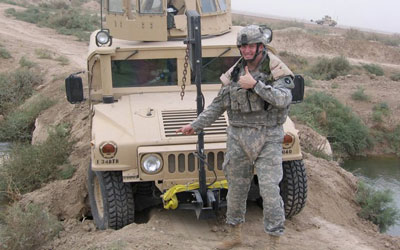Leadership pressures prepare Army Drill Sergeant for last line of IT defense
On Sept. 11, 2001, James Fitzer and the rest of the 3rd U.S. Infantry Regiment were conducting training exercises no more than half a mile from the Pentagon. When they heard a plane had hit the World Trade Center, they assumed it was a tragic accident. But following the second impact, they suspected that something disastrous was unfolding. Then, upon hearing an explosion and seeing a plume of smoke rise over a nearby hill, the gravity of the situation became undeniably real.
When Fitzer entered the military the previous year, he had planned on serving just long enough to qualify for the G.I. bill. But, as happened with so many others that fateful day, those well-laid plans were irreversibly changed.
“You always know the world can be an awful place sometimes, but it doesn’t really compute until you see it up close,” he says. “That day was when I realized how much evil there is and how important it is to resist.”
As members of the Old Guard, Fitzer and his company were called in to support search and rescue efforts. The same day, even as the Pentagon was still in flames, they were standing guard. And on day two they started recovering bodies, removing wreckage, and shoring up the floor supports so engineers could continue searching the upper floors.
In the harrowing weeks that followed, they continued removing rubble, recovering remains and ensuring proper burials for victims. The experience compelled Fitzer to put his plans for a computer science degree on hold so he could focus on helping bring justice to those responsible for the attacks.
In 2003, Fitzer transferred to being an inactive reservist and began pursuing his computer science degree. After two years, however, he was called up again, promoted to squad leader and mobilized to Iraq. He didn’t know it then, but the pressure he was learning to master by leading his men in combat and serving as a drill sergeant in the Reserves would later prove invaluable to excel in a civilian career in IT.
The next few years following his tour were filled with more schooling, work in various civilian IT positions and continued service in the Reserves. Then he was called up again. He began to feel with each mobilization that he was falling further behind the “power curve” of the latest technology.

But one small, seemingly random act helped him “recover the curve.” After posting to LinkedIn in 2013, expressing his desire to explore opportunities in the Lone Star state, a Microsoft vendor in Texas reached out. Soon he was working on site reliability for SharePoint Online, optimizing performance and resolving issues, such as in the event of a system outage.
That led to him being hired by Microsoft as a Service Engineer on the SharePoint Online Site Reliability Engineering team. In figurative terms, he is the last line of defense, and it didn’t take long for him to realize the importance of his ability to think under pressure, determine the best course of action and work under extreme duress — all skills he acquired as a squad leader in the U.S. Army Reserves.
As Fitzer puts it, “in the military, an imperfect plan right now is better than a perfect plan an hour or two later. I take that same view to the work I do today.”
He finds great reward in getting to work with problems that are unique within the industry, and in finding ways to turn failures into victories, additional skills that make veterans such attractive candidates for high-pressure IT roles.
Fitzer considers himself fortunate to be working at a company employing one of the technology sector’s most vibrant and involved communities of veterans. After 17 years in the military and having earned the rank of Staff Sergeant, next year Fitzer’s terms of service will come to an end and he will fully transition out of the Army Reserves. For any veterans transitioning to civilian life he offers this piece of advice:
“You might have been a Sergeant or a Lieutenant in the military, but when you enter the civilian world you feel like a private all over again. So check your ego at the door, open your ears, and figure out how things work and where you fit in.”
For Fitzer, that meant learning a technical skill that he could pair with the invaluable, irreplaceable ability to thrive under pressure, a talent which he acquired on the front lines of Iraq and which will continue serving him well throughout the remainder of his career.
